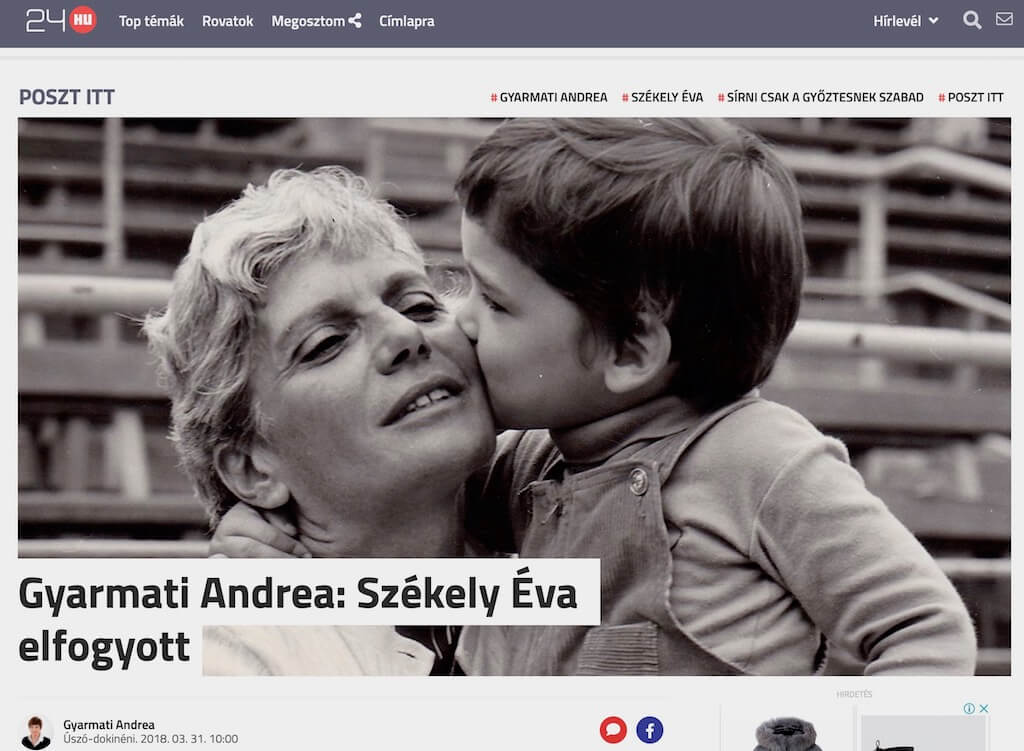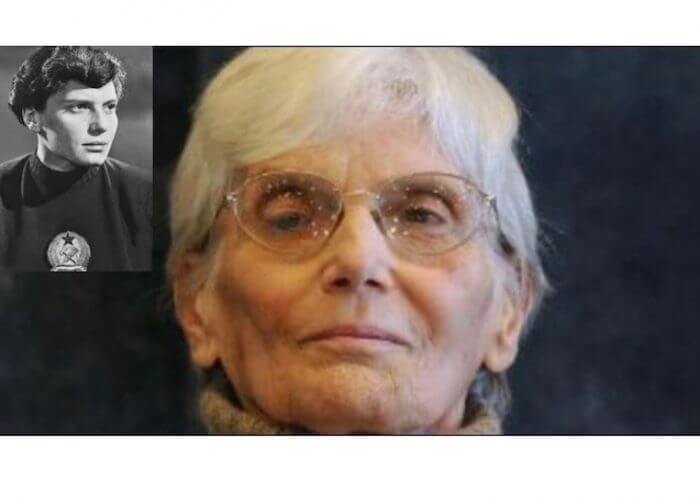Passages: Eva Szekely, Holocaust Survivor & Olympic Champion, Passes At 92

Eva Szekely, the 1952 Olympic 200m breaststroke champion and Holocaust survivor, has passed away at the age of 92. She was the first winner of an Olympic breaststroke crown who swam with a butterfly action: overarm recovery was ended when butterfly became an official stroke of its own on the way to the 1956 Olympic Games.
The Hungarian was Magyar swimming royalty. Andrea Gyarmati, the 1970 double European champion and 1972 two-times Olympic medallist whose father was also an Olympic champion, water polo player Dezso Gyarmati, paid tribute to her mother in a 2018 column at 24HU. All three are International Swimming Hall of Fame inductees.
She wrote of being born more into a dynasty than a family, but one in which laughter and happiness was the order of the day:
“At home, learning was the primary task, playing sports, even if you sometimes took it seriously, was not a livelihood. You had to figure out what you wanted to work on and get to the right schools. And for a good outcome, sport was a gift and a reward for us, not a mandatory job. So, when I turned four, I could go to the swimming pool, where I had a good time, and all my friends were there. In other words, there was no craze for “we must excel in sports” (which many people have often assumed without asking any of us). The image they were trying to project on to us, the cruel woman [Eva Szekely] torturing her baby in the water, was as far from reality as Mako was from Jerusalem.
“However, there were things that Mum didn’t pardon, and she brought us up the right way, and today I am grateful for what she taught me, brought to me, made me aware of: mastery.”
Inducted into the International Hall of Fame in 1976, Szekely had been expelled from the national swimming team a decade before she became Olympic champion: she was Jewish and lived at a time when the Nazis murdered around six million Jews as part of their “Final Solution”. In Hungary, three quarters of the Jewish population was wiped out. Eva survived. In 1941, Szekely’s swimming was halted by the discriminatory Third Jewish Law, which meant that she was confined to Jewish quarters and barred from most contact with non-jews and activities such as sport.
When World War II was over, Szekely went from strength to strength in the pool and life took on a new hue Between 1946 and 1954, she claimed 36 Hungarian titles, picking up silver over 200m breaststroke at the 1947 European Championships in glamorous Monte Carlo behind world record holder Nelly Van Vliet of the Netherlands.
There were eight golds and a solver at the two editions of the World Student Games she raced at, while her Olympic debut was most promising: at London 1948 in the first indoor Olympic pool in history, she finished fourth over 200m breaststroke, Van Vliet the champion.
Szekely’s career highlight unfolded at the 1952 Olympics in Helsinki, however.
Helsinki 1952

Eva Szekely – then and more recently. Photo Courtesy: ISHOF
The Games in Finland witnessed a dramatic breakthrough for Hungarian women, who claimed four of the five gold medals on offer, leaving the 100m backstroke crown to be won by the first South African Olympic swimming champion, Joan Harrison.
Magyar gold went to Katalin Szoke (100m freestyle), Valeria Gyenge (400m freestyle ahead of teammate Eva Novak in second), Eva Szekely (200m breaststroke) and a 4x100m freestyle quartet that included Szoke, Eva and her sister Ilona Novak and Judit Temes, third behind Szoke in the solo sprint event. Those seven Hungarian medals, which celebrated the work of coach Bela Rajki and disciples – among them Eva Szekely – fell just two shy of the United States’ tally, with just two bronze medals – the only two prizes won by American women – splitting the two nations for the top two place on the medals table.
Szekely lived her highlight at a time of soaring participation in Olympic swimming. Up from 34 countries in London, 1948, a record 47 nations were represented in the pool, of which 46 sent men and 23 sent women to Finland. The Games witnessed the first swimmers from Ceylon (now Sri Lanka), Guatemala, Hong Kong, Indonesia, Israel, Romania, Singapore, Venezuela and Vietnam. Saarland, Germany territory occupied by France in 1945 at the end of WWII, was allowed to compete autonomously in Helsinki.
Japan and Germany (now as the Federal Republic) were welcomed back into the international sports arena, their presence a source for extra satisfaction. in Szekely as she took the moment to swim for all those who had perished under Nazi rule. Szekely is celebrated in the International Jewish Sports Hall of Fame.
The affiliations of Continental China and East Germany, some of whose swimmers raced for a combined Germany, were not accepted for entry while Russians, who had raced at the 1912 Games under a Tsarist banner, made their first appearance under the Soviet flag. The 1952 Games also marked the debut in Olympic waters of the tumble turn.
The pool marked a return to outdoor swimming, with water temperatures at the Vinti Olympic complex a touch chilly, at 23C. These were the first Games at which the clock alone determined progress to semis and finals.
Szekely claimed the 200m crown in an Olympic record of 2:51.7, almost three seconds clear of her teammate Eva Novak. Third went to Britain’s Elenor Gordon.
Marriage To Dezso Gyarmati – and the birth of Andrea: all three would end up in the Hall of Fame
Szekely married Dezso Gyarmati, one of the greatest water polo players in history. To some he was the greatest. He took part in five Olympiads, from 1948 to 1964. He led Hungary to Olympic gold medals three times: in 1952, 1956 and 1964. He also won a silver at the London Olympics in 1948 and a bronze in 1960. He managed to win five medals in five consecutive Olympics, a unique feat . He also captained winning Hungarian teams at the 1954 and 1962 European Championships.
An excellent swimmer with a best time of 58.5 seconds for 100m (quite fast in that era), Gyarmati was called the “world’s fastest water polo player”. He was ambidextrous and could play either back or forward. As Hungary’s coach he won the first FINA World Championships in Belgrade 1973 and the Olympic title in 1976. He was considered a national hero and later on he became a member of Parliament.
On the way to the 1956 Olympics in Melbourne, Szekely and Gyarmati had a daughter, Andrea, who would grow up to be an Olympic silver medallist in the 100m backstroke and bronze medallist in the 100 ‘fly at Munich 1972 and Hungary’s top woman swimmer at the inaugural World Championships in Belgrade in 1973. Andrea Gyarmati also claimed European titles over 100m butterfly and 200m backstroke at Barcelona in 1970, a silver in the 100m backstroke making it three solo podium visits.
Andrea was still young when her parents left for Melbourne to compete in the 1956 Games at a time of Hungarian uprising and Soviet crackdown. Mum missed daughter and Eva lost 5kg as she pined and fretted. Even so, she took silver in the 2090m breaststroke behind Germany’s Ursula Happe.
Szekely and Gyarmati would visit Vienna in 1957. They used the moment to escape communism and defect to the United States but their being away did not last long: they returned home to look after Szekely’s elderly parents and the Olympic breaststroke champion established a life as a prominent swim coach, among her charges her daughter Andrea, who would join her parents in the Hall of Fame in 1995.
In her 2018 tribute, Andrea notes that Eva’s book “The Cry” was a bestseller. Andrea got her own love of writing and reading, one of “my favourite pastimes”, from her mother.
When swimming coaching was done, Szekely worked as a chemist and loved to spend quiet time in contemplation and writing down her recollections and thoughts on life. Her work is published in several volumes of short stories and biographical material. She and Gyarmati did not survive as a couple. After their divorce, Gyarmati left Hungary and coached water polo in many Western countries, including Colombia and Canada. He was inducted into ISHOF in the same year as Eva, 1976. He died in 2013.
On Saturday, the love of his young life also left this world.




Darby Goodwin ??
Any relation to Allie Szekely at Stanford?
Very inspiring. Thanks for sharing.
Only the winners are allowed to cry. That is probably the meaning of her books title. She was a fighter and worked for her titles hard. Her book is a great read.
Rest In Peace
No. Very common name in Transylvania and up to 800,000 Hungarians that come from the Szekely “tribe”. Allie’s grandfather was born in Transylvania.